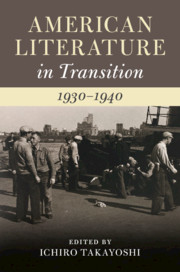49 results
23 - Literary Criticism
- from Part II - Forms, Genre, and Media
-
-
- Book:
- The Cambridge History of American Modernism
- Published online:
- 13 July 2023
- Print publication:
- 20 July 2023, pp 397-412
-
- Chapter
- Export citation
Part II - Formats
-
- Book:
- American Literature in Transition, 1930–1940
- Published online:
- 09 November 2018
- Print publication:
- 15 November 2018, pp 247-358
-
- Chapter
- Export citation
Copyright page
-
- Book:
- American Literature in Transition, 1930–1940
- Published online:
- 09 November 2018
- Print publication:
- 15 November 2018, pp iv-iv
-
- Chapter
- Export citation
Part I - Themes
-
- Book:
- American Literature in Transition, 1930–1940
- Published online:
- 09 November 2018
- Print publication:
- 15 November 2018, pp 25-246
-
- Chapter
- Export citation
Part III - Institutions
-
- Book:
- American Literature in Transition, 1930–1940
- Published online:
- 09 November 2018
- Print publication:
- 15 November 2018, pp 359-441
-
- Chapter
- Export citation
Notes on Contributors
-
- Book:
- American Literature in Transition, 1930–1940
- Published online:
- 09 November 2018
- Print publication:
- 15 November 2018, pp viii-xiii
-
- Chapter
- Export citation
Figures
-
- Book:
- American Literature in Transition, 1930–1940
- Published online:
- 09 November 2018
- Print publication:
- 15 November 2018, pp vii-vii
-
- Chapter
- Export citation
Chronology
-
- Book:
- American Literature in Transition, 1930–1940
- Published online:
- 09 November 2018
- Print publication:
- 15 November 2018, pp xiv-xxiv
-
- Chapter
- Export citation
Chapter 11 - Look at the World!
- from Part I - Themes
-
-
- Book:
- American Literature in Transition, 1930–1940
- Published online:
- 09 November 2018
- Print publication:
- 15 November 2018, pp 229-246
-
- Chapter
- Export citation
Introduction
-
-
- Book:
- American Literature in Transition, 1930–1940
- Published online:
- 09 November 2018
- Print publication:
- 15 November 2018, pp 1-24
-
- Chapter
- Export citation
Index
-
- Book:
- American Literature in Transition, 1930–1940
- Published online:
- 09 November 2018
- Print publication:
- 15 November 2018, pp 442-458
-
- Chapter
- Export citation
Contents
-
- Book:
- American Literature in Transition, 1930–1940
- Published online:
- 09 November 2018
- Print publication:
- 15 November 2018, pp v-vi
-
- Chapter
- Export citation

American Literature in Transition, 1930–1940
-
- Published online:
- 09 November 2018
- Print publication:
- 15 November 2018
Part IV - Publishing
-
- Book:
- American Literature in Transition, 1920–1930
- Published online:
- 11 December 2017
- Print publication:
- 28 December 2017, pp 395-458
-
- Chapter
- Export citation
Index
-
- Book:
- American Literature in Transition, 1920–1930
- Published online:
- 11 December 2017
- Print publication:
- 28 December 2017, pp 473-490
-
- Chapter
- Export citation
Contents
-
- Book:
- American Literature in Transition, 1920–1930
- Published online:
- 11 December 2017
- Print publication:
- 28 December 2017, pp v-vii
-
- Chapter
- Export citation
Part II - Influences
-
- Book:
- American Literature in Transition, 1920–1930
- Published online:
- 11 December 2017
- Print publication:
- 28 December 2017, pp 219-334
-
- Chapter
- Export citation
Part I - Players
-
- Book:
- American Literature in Transition, 1920–1930
- Published online:
- 11 December 2017
- Print publication:
- 28 December 2017, pp 25-218
-
- Chapter
- Export citation
Chapter 8 - The New Negro
- from Part I - Players
-
-
- Book:
- American Literature in Transition, 1920–1930
- Published online:
- 11 December 2017
- Print publication:
- 28 December 2017, pp 158-183
-
- Chapter
- Export citation
Part III - Intersections
-
- Book:
- American Literature in Transition, 1920–1930
- Published online:
- 11 December 2017
- Print publication:
- 28 December 2017, pp 335-394
-
- Chapter
- Export citation



